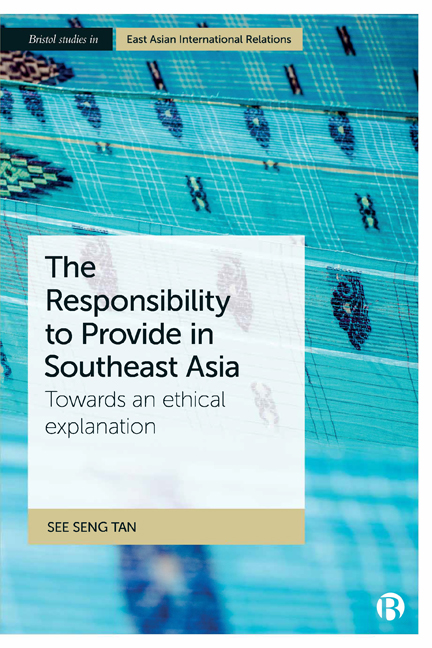Book contents
- Frontmatter
- Dedication
- Contents
- List of Tables
- List of Abbreviations
- Acknowledgements
- 1 Towards an Ethos of Responsibility in Southeast Asia
- 2 The Responsibility to Protect (R2P) and Responses from Southeast Asia
- 3 Towards a ‘Responsibility to Provide’ (R2Provide) in Southeast Asia
- 4 Institutionalizing Security Regionalism: Responsibility as ‘Response Ability’
- 5 Responsible Provision in HADR, Conflict Management and Human Rights
- 6 Towards the Responsible Management of Disputes in Southeast Asia
- 7 Communitarianism, Liberalism and the Limits of Responsibility in Southeast Asia
- 8 Levinas and the Responsibility to Provide in Southeast Asia
- 9 The Responsibility to Provide: Implications for the Region and Beyond
- Notes
- Bibliography
- Index
6 - Towards the Responsible Management of Disputes in Southeast Asia
Published online by Cambridge University Press: 02 March 2021
- Frontmatter
- Dedication
- Contents
- List of Tables
- List of Abbreviations
- Acknowledgements
- 1 Towards an Ethos of Responsibility in Southeast Asia
- 2 The Responsibility to Protect (R2P) and Responses from Southeast Asia
- 3 Towards a ‘Responsibility to Provide’ (R2Provide) in Southeast Asia
- 4 Institutionalizing Security Regionalism: Responsibility as ‘Response Ability’
- 5 Responsible Provision in HADR, Conflict Management and Human Rights
- 6 Towards the Responsible Management of Disputes in Southeast Asia
- 7 Communitarianism, Liberalism and the Limits of Responsibility in Southeast Asia
- 8 Levinas and the Responsibility to Provide in Southeast Asia
- 9 The Responsibility to Provide: Implications for the Region and Beyond
- Notes
- Bibliography
- Index
Summary
Introduction
So far, I have sought to develop the thesis that responsible sovereignty in Southeast Asia is best understood and embodied in the notion of a shared responsibility to provide. But in a conventional sense, responsible sovereignty is equally about the willingness of states to resolve their claims to their perceived sovereign rights through subjecting disputes they have with one another to mediation, arbitration and possibly even adjudication, with the end goal of regional resolution and reconciliation – even if they end up on the ‘losing side’. This includes the ability of states at times to dial down their nationalist and populist proclivities, whether in terms of tempering the nationalist demands of their citizenry or the resort by their political leaders to playing the nationalist card in the attempt to harness its force in support of their claims (Krebs, 2017), as well as adopting a middle approach that includes the use of tough rhetoric against a rival without overplaying the nationalist card, which reportedly describes Vietnam's approach to the diplomatic standoff sparked by China's deployment of the Haiyang Shiyou – or Hải Dương for the Vietnamese – 981 oil rig near the disputed Paracel Islands from May to July in 2014 (Nhung, 2016).
The aim of this chapter therefore is to trace Southeast Asia's embryonic experimentation with a rules-based approach – which could involve legal means but is not exclusive to them – to the management of its intra-regional and extra-regional relations, and to assess its implications for regional order and security. Understood here, ‘legalization’ – or ‘institutionalization’ if you like – involves the degree to which common rules and norms shape the behaviours of states, whether or not they actually go before the courts (Kahler, 2000). Efforts in this respect include ASEAN's on-going (and challenging) implementation of its charter and the selective resort by several ASEAN countries to legal means to settle disputes involving trade and territorial concerns. Although Southeast Asia generally lags behind some other regions in its willingness to countenance legalization, a growing number of Southeast Asian countries have in fact relied on third-party arbitration and/or adjudication. That they have sought to settle disputes between themselves and external parties, on one hand, and among themselves on an intra-mural basis, on the other, implies a slow but gradual willingness to seek legal recourse.
- Type
- Chapter
- Information
- The Responsibility to Provide in Southeast AsiaTowards an Ethical Explanation, pp. 101 - 126Publisher: Bristol University PressPrint publication year: 2019

